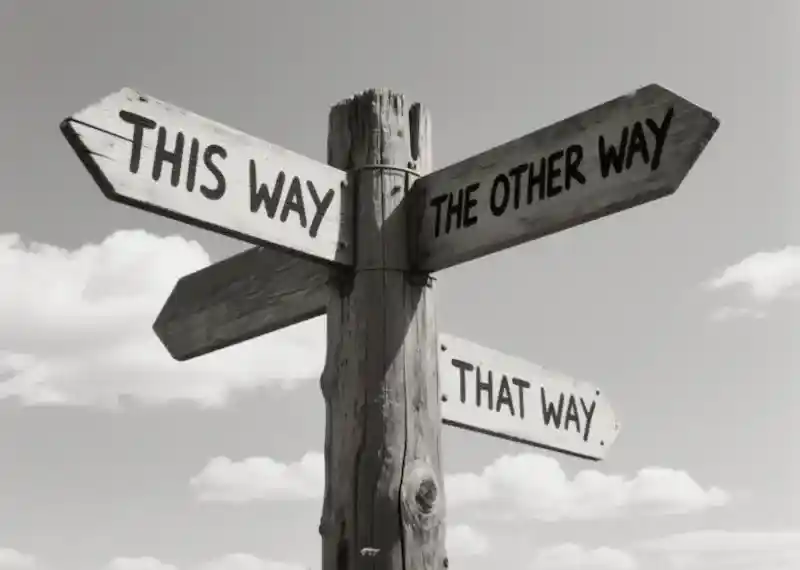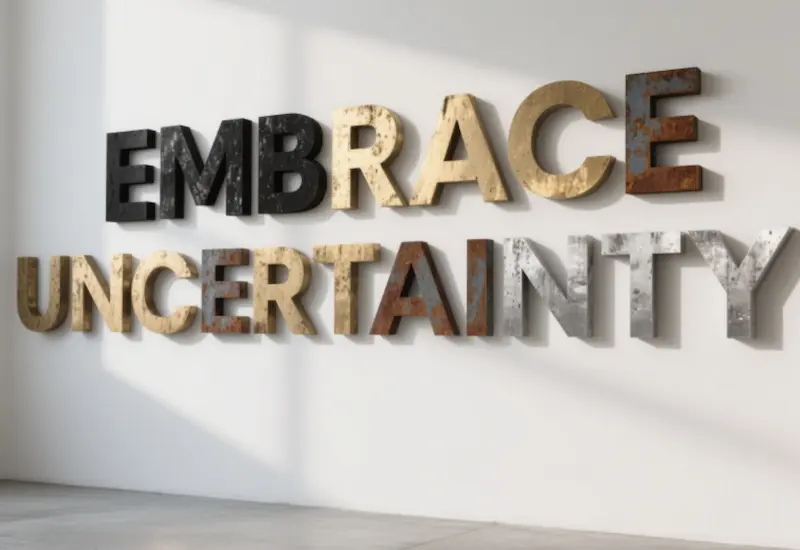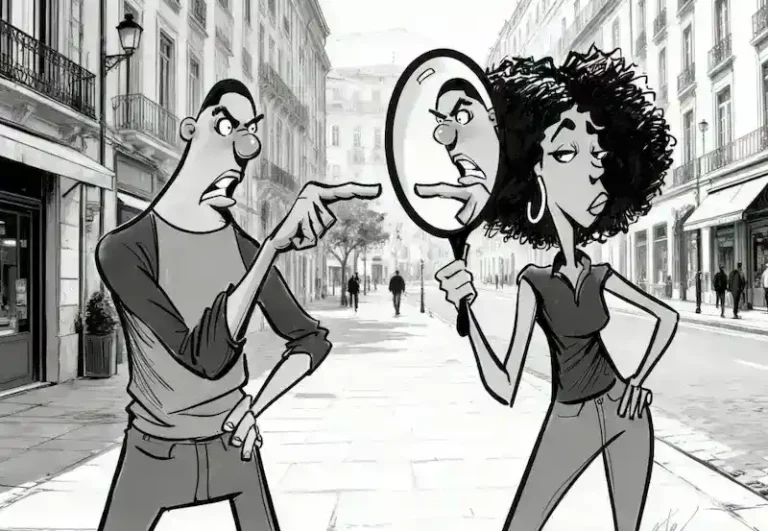Accepting Life’s Uncertainties: Finding Peace in Every Twist and Turn

Table of Contents
Life is often compared to a road trip—except the GPS frequently glitches, the map gets torn, and detours pop up when you least expect them. You might set out for a sunny beach, only to end up in a rainy forest. Or plan a quick drive, but find yourself on a winding path that takes twice as long. These unplanned moments? They’re not flaws in the journey. They’re the journey itself. And learning to navigate them starts with one powerful skill: accepting life’s uncertainties. Accepting life’s uncertainties allows us to find peace even when the path is unclear.
Why Accepting Life’s Uncertainties Isn’t Surrender—It’s Strength
Many of us grow up thinking we should control life. We set goals, make five-year plans, and feel anxious when things veer off course. But research shows this need for control can backfire. A 2023 study from the University of California, Berkeley, found that people who struggle to accept uncertainty report higher levels of stress, burnout, and even relationship strain. Why? Because life is uncertain—and fighting that truth drains our energy.
Accepting life’s uncertainties is not merely a concept; it is a transformative practice that leads to emotional resilience. By actively accepting life’s uncertainties, we empower ourselves to move forward despite challenges.
Acceptance, on the other hand, isn’t about throwing your hands up and saying, “Whatever.” It’s about recognizing that some things are out of your control—and choosing to focus on what is within your power: your response. Think of it like sailing: You can’t control the wind, but you can adjust your sails.

Allowing Life’s Detours: When Plans Fall Apart
Remember that colleague who seemed to have it all—great job, steady income, clear career ladder—until their company suddenly downsized? Or the friend who planned to marry their high school sweetheart, only to realize they wanted different things? Life has a way of hitting pause on our “perfect” scripts. And that’s okay.
Accepting life’s uncertainties can lead to unexpected opportunities for personal and professional growth. By embracing this mindset, we can turn challenges into stepping stones.
Take Maria, a marketing manager in Chicago. For a decade, she thrived at a traditional ad agency, climbing from intern to director. Then, in 2020, the pandemic hit, and her department was eliminated overnight. “I felt like a failure,” she told me. “I’d spent years building this career, and it vanished in a meeting.”
Stories of individuals who successfully navigate their lives often highlight the importance of accepting life’s uncertainties. These narratives remind us that our responses to unexpected events shape our journey.
In essence, accepting life’s uncertainties can be likened to adjusting sails while sailing; it’s about control over our reactions rather than the wind itself.
Instead of wallowing, Maria let herself grieve—and then got curious. She’d always loved storytelling, so she took online courses in digital content creation. Six months later, she launched a freelance business helping small brands tell their stories. “Losing that job forced me to ask: What do I actually want to do?” she says. “Now, I’m happier than I ever was in that ‘perfect’ role.”
This lesson in accepting life’s uncertainties can be observed in many successful individuals who pivot quickly when faced with unexpected challenges.
Her story illustrates how accepting life’s uncertainties doesn’t mean giving up but rather fostering a mindset of growth and adaptability.
Stories like Maria’s aren’t rare. According to the U.S. Bureau of Labor Statistics, the average American changes jobs 12 times in their lifetime—and many of those changes are unplanned. The difference between feeling defeated and reborn? Letting the detour teach you something.
Embracing Mistakes: Wrong Turns and Missteps as Teachers
We’ve all been there: You invest time in a project that flops. You date someone who turns out to be wrong for you. You take a job that feels like a dead end. In the moment, these feel like failures. But hindsight often reveals them as classroom moments.
Consider Jason, a tech entrepreneur in Silicon Valley. His first startup, a social media app for travelers, raised $500,000 in funding—then crashed within a year. “I thought we’d nailed the idea, but we ignored user feedback,” he admits. “We built what we thought was cool, not what people needed.”
Instead of quitting, Jason analyzed every misstep: He’d rushed the launch, neglected customer support, and hired friends instead of experts. Two years later, he launched a new app—this time, prioritizing user research and building a team with complementary skills. It’s now used by over 2 million people. “That first failure wasn’t a waste,” he says. “It was the best MBA I ever got.”
Psychologists call this “productive failure.” A 2022 study in Psychological Science found that people who reflect on their mistakes (rather than avoiding them) develop stronger problem-solving skills and greater confidence. As author Brené Brown puts it: “Vulnerability is not winning or losing; it’s having the courage to show up and be seen when we have no control over the outcome.”

Effort in the Process, Peace with the Outcome
There’s a common myth that accepting uncertainty means being passive—that you just “let life happen.” But the wisdom of “working on the cause, letting go of the effect” is about balance: Give your all to what you can control, and release attachment to what you can’t.
Maya, a novelist in New York, knows this well. For seven years, she wrote and rewrote a historical fiction manuscript, sending it to 47 publishers—all of whom rejected it. “I wanted that book to be published so badly, I started to hate writing,” she says. “Then I realized: My job is to tell the story. Whether it gets published? That’s out of my hands.”
She kept writing—this time, for the joy of it, not the end goal. A year later, she sent a new draft to a small press. It was accepted, and went on to win a regional book award. “I didn’t try less,” she says. “I just stopped torturing myself over the result. That freedom made the writing better.”
This balance is backed by science. A 2021 study from Harvard Medical School found that people who practice “effort without attachment” report lower anxiety and higher life satisfaction. They’re more persistent because they’re motivated by passion, not fear of failure.
Rethinking Success and Failure
We love to label moments as “good” or “bad”: A promotion is a win, a layoff is a loss. But life is rarely that black-and-white. Sometimes, closed doors lead to better rooms—and open doors come with unexpected costs.
Take Dr. Sarah Johnson, a biologist at Stanford. Early in her career, she spent three years researching a potential cancer treatment—only to discover it was ineffective. “I felt devastated,” she recalls. “But that failure led me to question my methods, which eventually uncovered a new approach to targeting tumors. Now, that work is saving lives.”
On the flip side, success can bring its own challenges. Mark, a software engineer in Austin, sold his startup for $10 million at 32. “I thought I’d be happy forever,” he says. “Instead, I felt empty. I’d defined myself by ‘winning,’ and suddenly, I didn’t know what to do next.” It took two years of therapy and volunteer work for him to rediscover purpose beyond money.
These stories echo a truth ancient philosophers knew: Success and failure are just markers, not destinations. As the Stoic philosopher Epictetus wrote: “You don’t control what happens, only how you respond to it.”
Every Experience Has a Purpose—Even the Painful Ones
No matter how chaotic or painful a moment feels, it’s weaving itself into the fabric of who you are. The tough conversations, the missed opportunities, the “wasted” years—they’re all teaching you resilience, clarity, or compassion.
Consider Alex, an avid hiker from Colorado. In 2019, he planned to summit Mount Elbert, the highest peak in the Rockies. But a sudden blizzard trapped him at 13,000 feet. “I thought I was prepared, but nature had other plans,” he says. For 36 hours, he huddled in a emergency shelter, rationing food and water, and fighting panic.
He never reached the summit that trip. But the experience changed him. “I learned I’m stronger than I thought,” he says. “And I stopped taking small moments for granted—the warmth of a cup of coffee, a clear sky, the sound of my kids laughing. That storm didn’t ruin my hike. It gave me a new way to see life.”

These examples showcase that accepting life’s uncertainties leads to breakthroughs and achievements that may not have been possible otherwise.
Failure Isn’t a Sign You’re Not Good Enough
One of the most damaging myths in American culture is that failure means you’re not smart, talented, or worthy enough.
By acknowledging the reality of accepting life’s uncertainties, we can better prepare ourselves for the ups and downs that come our way.
But history tells a different story.
Famous “Failures” Who Changed the World
| Person | “Failure” | What Happened Next |
|---|---|---|
| J.K. Rowling | Rejected by 12 publishers | Harry Potter became a billion-dollar franchise |
| Steve Jobs | Fired from Apple | Founded NeXT, returned to Apple, revolutionized tech |
| Oprah Winfrey | Fired from her first TV job | Built a media empire and became a cultural icon |
| Michael Jordan | Cut from his high school team | Became the greatest basketball player of all time |
These aren’t outliers. They’re proof that failure is not the opposite of success—it’s part of it.
A Harvard Business School study found that entrepreneurs who had previously failed were 30% more likely to succeed in their next venture than first-time founders.
Why? Because they’d already learned the hard lessons.
Practical Ways to Embrace Life’s Uncertainty
You don’t have to become a monk or quit your job to adopt this mindset. Try these science-backed strategies:
1. Practice “Negative Visualization” (Stoic Exercise)
Imagine the worst-case scenario. Then ask: Could I survive it? Most of the time, the answer is yes. This reduces fear of the unknown.
2. Keep a “Lessons Learned” Journal
After every setback, write:
- What happened
- What I learned
- How I’ll apply it
Over time, you’ll see a pattern of growth.
3. Use the 5-Year Rule
Ask: Will this matter in 5 years? If not, don’t let it consume your energy.
4. Build a Support Network
Talk to mentors, therapists, or trusted friends. As Brené Brown says, “Vulnerability is the birthplace of belonging.”
5. Adopt a “Growth Mindset” (Carol Dweck)
Believe that abilities can be developed. Replace “I’m not good at this” with “I’m not good at this yet.”
The Power of “And” Thinking
Instead of “either/or,” try “both/and”:
- I am hurting and I am healing.
- I made a mistake and I am still worthy.
- I failed and I will try again.
This mindset, rooted in mindfulness and cognitive behavioral therapy (CBT), allows you to hold complexity without judgment.

Reflecting on your journey of accepting life’s uncertainties can provide clarity and direction in navigating future challenges.
Final Thoughts: Let Life Surprise You
Life isn’t about avoiding wrong turns. It’s about learning to navigate them with courage and curiosity.
Ultimately, the journey of accepting life’s uncertainties is about embracing the lessons they bring rather than avoiding them.
When you embrace life’s uncertainty, you stop fearing mistakes. You stop seeing love gone wrong as a flaw in your character. You stop measuring your worth by outcomes.
Instead, you focus on the journey—the effort, the lessons, the quiet moments of insight.
Because here’s the truth:
You don’t have to have it all figured out. You just have to keep going.
Every misstep, every heartbreak, every “failure”—they’re not proof you’re broken. They’re proof you’re alive, trying, and growing.
So the next time life throws you a curveball, take a breath and ask:
🔹 What is this teaching me?
🔹 How can I grow from this?
🔹 What new door might this close one be opening?
In conclusion, accepting life’s uncertainties is a vital aspect that leads to personal evolution and deeper understanding of our experiences.
Life doesn’t reward perfection. It rewards resilience, adaptability, and the courage to keep going—even when the path is unclear.
By learning to embrace life’s uncertainty and finding personal growth through failure, you’re not just surviving. You’re evolving.
Your setbacks aren’t the end of your story. They’re the plot twist that makes it worth telling.
Now it’s your turn:
- Share a time when a “mistake” led to unexpected growth.
- Comment below or share this article with someone who needs to hear: It’s okay to not be okay.
Because in the end, the most beautiful lives aren’t the ones without storms—but the ones that learned how to dance in the rain.






